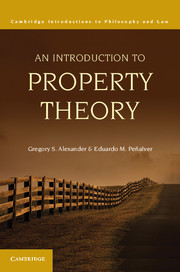Conclusion
Published online by Cambridge University Press: 05 June 2012
Summary
POINTS OF CONVERGENCE
Throughout this book, we have tended to emphasize the differences among the competing theories of property we have explored. Although this focus has been useful in understanding what is distinctive about each theory, it risks leaving readers with a misimpression about the degree of disagreement among them. Of course, it is true that the theories diagnose many property problems differently and frequently generate conflicting normative prescriptions, but there are also important points of convergence. In this conclusion, we will discuss three of these areas of apparent agreement. The first is the overriding force of human necessity. The second is the importance of things in property law. And the third, which is related, is the value of so-called property rules.
While the different theories offer different explanations of these issues, there appears to be an overlapping consensus concerning their significance. We cannot hope to provide a comprehensive discussion of these interesting topics, but their salience across numerous property theories suggest that they represent fruitful avenues for future property thinking.
- Type
- Chapter
- Information
- An Introduction to Property Theory , pp. 204 - 214Publisher: Cambridge University PressPrint publication year: 2012

